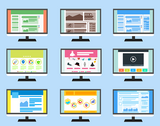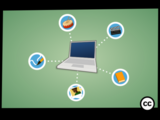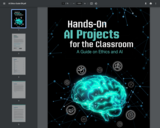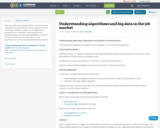
- Author:
- Liz Crouse
- Shawn Lee
- Date Added:
- 05/31/2020



In this guide, students’ exploration of AI is framed within the context of ethical considerations and aligned with standards and concepts, and depths of understanding that would be appropriate across various subject areas and grade levels in K–12. Depending on the level of your students and the amount of time you have available, you might complete an entire project, pick and choose from the listed activities, or you might take students’ learning further by taking advantage of the additional extensions and resources provided for you. For students with no previous experience with AI education, exposure to the guided learning activities alone will create an understanding of their world that they likely did not previously have. And for those with some background in computer science or AI, the complete projects and resources will still challenge their thinking and expose them to new AI technologies and applications across various fields of study.
Project 1: Fair's Fair
Project 2: Who is in Control?
Project 3: The Trade-offs of AI Technology
Project 4: AI and the 21st Century Worker
Visit the ISTE website with all the free practical guides for engaging students in AI creation: https://www.iste.org/areas-of-focus/AI-in-education.

This collection of lessons represent adapted and remixed instructional content for teaching media literacy and specifically civic online reasoning through distance learning. These lessons take students through the steps necessary to source online content, verify evidence presented, and corroborate claims with other sources.
The original lesson plans are the work of Stanford History Education Group, licensed under CC 4.0. Please refer to the full text lesson plans at Stanford History Education Group’s, Civic Online Reasoning Curriculum for specifics regarding background, research findings, and additional curriculum for teaching media literacy in the twenty-first century.

This social media literacy unit introduces students to foundational skills in analyzing images and social media posts. It also reenforces critical thinking questions that can be applied to various forms of media. This unit was taught to 9th grade students but is easily adaptible to a range of secondary classrooms. It was also taught in conjunction with another unit focused on social media platforms and content.

This unit engages students in a variety of activities that analyze and reflect on the role of social media in our everyday lives. This includes options for collaborative group work, reading nonfiction articles, a design challenge and presentations to communicate ideas. The unit also includes a formal writing assessment option that aligns with the Common Core State Writing Standards. Activities can be adapted or combined in a variety of ways to support student reflection and analysis. These lessons were piloted in 9th grade English classes but are suitable or a range of secondary students.

This interactive lesson helps students understand how companies use algorithms to sort job applicants. It also encourages students to reflect on how digital data mining also can contribute to the hiring process. Students examine resumes and digital data to consider the ways in which our data may open or close opportunities in an increasingly digitized hiring market.

Students will look at social medias and what identities are crafted in those formats, both for social media celebrities and their own digital footprints. This lesson is part of a media unit curated at our Digital Citizenship website, "Who Am I Online?"